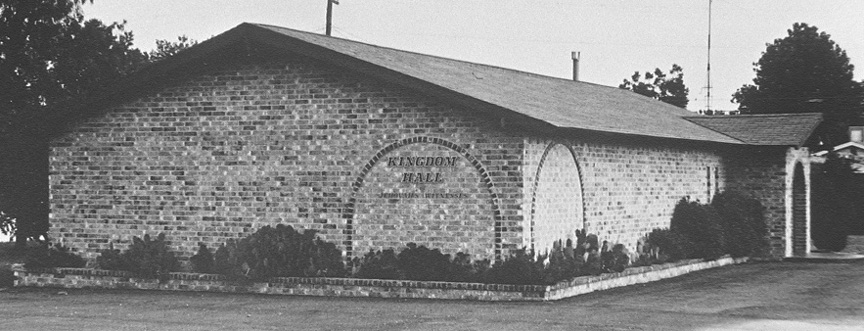| The
formation of the Coleman Congregation
of Jehovah’s Witnesses came about
quite slowly. In the early years
of this century there was no formal
congregation, only a few local people
reading their Bibles along with the
publications of the Watchtower Bible
and Tract Society which they looked
to for research and help in
understanding. Soon there were
several
families getting together quite often
to discuss the things they were
learning
from the scriptures. Among these
were the Swans, Parkers and Lynch
family. Between 1910 and 1920
various travelling representatives
of the Watchtower Society came through
and spent time helping these families
and encouraging them in their Bible
study. Among those who visited
during this time was Milton C.
Henschel, who has been a member of the
governing
body of Jehovah’s Witnesses for a
number of years. It was in the
late 1920’s that meetings began to be
held on a regular basis in the home
of Jett Parker, Sr.
By
the early 1940’s, attendance at
these meetings was running at about
twenty
persons. Even though Jehovah’s
Witnesses have always made it a
practice
not to take up collections or
solicit funds, voluntary donations
were available
to purchase a badly needed meeting
place. The congregation
obtained
a barracks building from Brownwood,
which they had moved to the site of
their current Kingdom Hall on Santa
Anna Avenue. Then, with the
volunteer
help of nearby congregations of
Jehovah’s Witnesses, they remodeled
the
barracks for use as a place of
worship. These were designed
with
the purpose of helping those
associated with the congregation to
be better
able to talk to others informatively
about God’s Kingdom, following the
example of Jesus and his early
disciples.
It
was also about this time that the
congregation began to experience
difficulties.
Jehovah’s Witnesses have long been
known for their active
evangelism.
From their study of the Bible, they
understand God’s Kingdom to be a
real
government in the heavens with Jesus
Christ as king. Jehovah’s
Witnesses
are convinced that involving
themselves in any political activity
would
be contrary to the love and unity
that Jesus said should exist among
his
followers. Therefore, they
take a completely neutral stand in
political
affairs of any nation. You may
he able to see why Jehovah’s
Witnesses
were not well liked during the
second world war. Coleman
County was
no exception. Some members of
the congregation were arrested for
speaking to others about their
beliefs. Perhaps they felt the
witnesses
were opposing the war effort and
being subversive. Eventually a
court
ordered injunction issued in Fort
Worth brought an end to the arrests
in
Coleman and surrounding
counties. Of course this
brought a certain
amount of relief from anxiety to
members of the congregation.
Through
the
years different ones have moved to
Coleman to work with the
congregation,
such as the Myers, Youngs, Fienstags
and Taylors, to mention a few.
Nearly everyone who was living here
at the time remembers the tornado of
1975 that destroyed the Kingdom Hall
and killed Caither and Wilma Taylor
who were living in a small trailer
next to the Kingdom Hall at that
time.
The Taylors were well liked by many,
and the loss was a shock to more
than
just those associated with the
congregation.
The
American Legion was kind enough to
let the congregation meet in their
hall
while in the process of
reconstructing a new meeting
place. Around
this time the Hernandezes and
Youngbloods moved in to help the
congregation.
With the much appreciated volunteer
help of surrounding congregations,
a new Kingdom Hall was built within
a few months. In November
1976,
John C. Booth, a member of the
governing body of Jehovah’s
Witnesses, came
to Coleman to deliver a special
address and dedicate the new
building to
the worship of Jehovah God.
--------------------------------------------------------------------------------

1974

1983
|